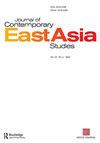IF 1.4
Q1 AREA STUDIES
引用次数: 0
摘要
具体而言,本文试图回答以下问题:(1)改革开放时期党军关系是如何演变的,学者们是如何概念化这种演变的?(3)改革的过程和结果对党军关系的现状及其未来轨迹有何启示?这一分析表明,改革开放以来,中国的党军关系表现出了显著的稳定性,但这种稳定性是通过赋予军队在军事事务管理方面的实质性自主权来实现的,这种关系往往被概念化为“有条件的服从”。在此过程中,安全环境中消极趋势的积累和军事准备的明显不足促使党的领导层对军队进行组织改革。本文章由计算机程序翻译,如有差异,请以英文原文为准。
Explaining military reforms under Xi Jinping: military effectiveness, power consolidation, and party-military relations in China
ABSTRACT This article aims to take a fresh look at the relationship between party and military institutions in China by focusing on military reforms pursued under Xi Jinping. Concretely, this article attempts to answer the following questions: (1) How have party-military relations evolved during the reform era and how do scholars conceptualize this development?; (2) What distinguishes Xi’s military reforms from previous efforts made by his predecessors?; and (3) What do the processes and outcomes of the reforms suggest about the state of party-military relations and its future trajectory? This analysis shows that China’s party-military relationship during the reform era has exhibited remarkable stability, but the stability has only been achieved by granting the military substantial autonomy in the management of military affairs, creating a relationship often conceptualized as “conditional compliance.” Along the way, the accumulation of negative trends in the security environment and the perceived lack of military readiness have urged the party leadership to carry out organizational reforms to the military. The sweeping implementation of military reforms under Xi, however, has had a limited effect on party-military relations, leaving the party control over the military compromised rather than reinforced.
求助全文
通过发布文献求助,成功后即可免费获取论文全文。
去求助
来源期刊

Journal of Contemporary East Asia Studies
Social Sciences-Cultural Studies
CiteScore
2.50
自引率
0.00%
发文量
10
审稿时长
6 weeks
 求助内容:
求助内容: 应助结果提醒方式:
应助结果提醒方式:


